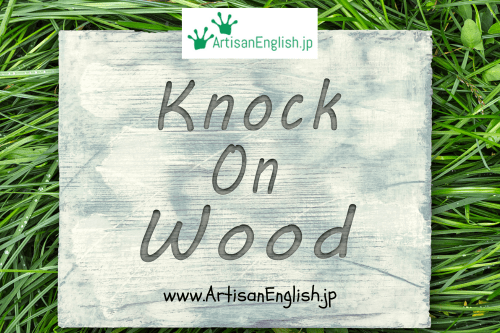
YouTube / iTunes / Spotify / Radio Public / Pocket Casts / Google Podcasts / Breaker / Overcast
Listen to ArtisanEnglish.jp posts & lesson intros here.
Phrase: Knock on wood
The phrase knock on wood is a well-known superstition often used for good luck.
When someone says knock on wood, they usually follow it by tapping or knocking on a piece of wood to avoid tempting fate or to prevent bad luck.
The origin of this phrase can be traced back to ancient times when people believed that good spirits lived in trees.
By knocking on wood, they sought the protection of these benevolent spirits.
Of course, like many things in English, the exact origin of the phrase is uncertain, but the practice of knocking on wood for luck or to ward off evil can be found in many cultures and traditions worldwide.
In modern times, knock on wood is often used in casual conversations when someone wants to avoid jinxing a good situation or to express a wish for continued good fortune.
For example, if someone says, “I’ve never been in a car accident, knock on wood,” they use the phrase to acknowledge their good fortune and express the hope that it will continue.
The phrase is so popular that it is often used even when no wood is present, with people simply tapping their heads or any nearby surface.
This lighthearted use, indicating the person is a blockhead, shows its enduring presence in everyday language.
Knocking on wood is a widely recognized superstition with roots in ancient pagan beliefs and customs, perhaps even before Christianity.
Whether used seriously or in jest, the phrase remains a part of everyday speech, reminding us of the enduring power of superstitions and the desire for good luck in our lives.
So, if you’re hoping for good fortune, knock on wood!
Flesch-Kincaid Readability Test
This post is understandable by someone with at least an 8th-grade education (age 13 – 14).
On the Flesch-Kincaid reading-ease test, this post scores 63.
The easier a passage is to read, the higher the score on a scale of 0 – 100.

